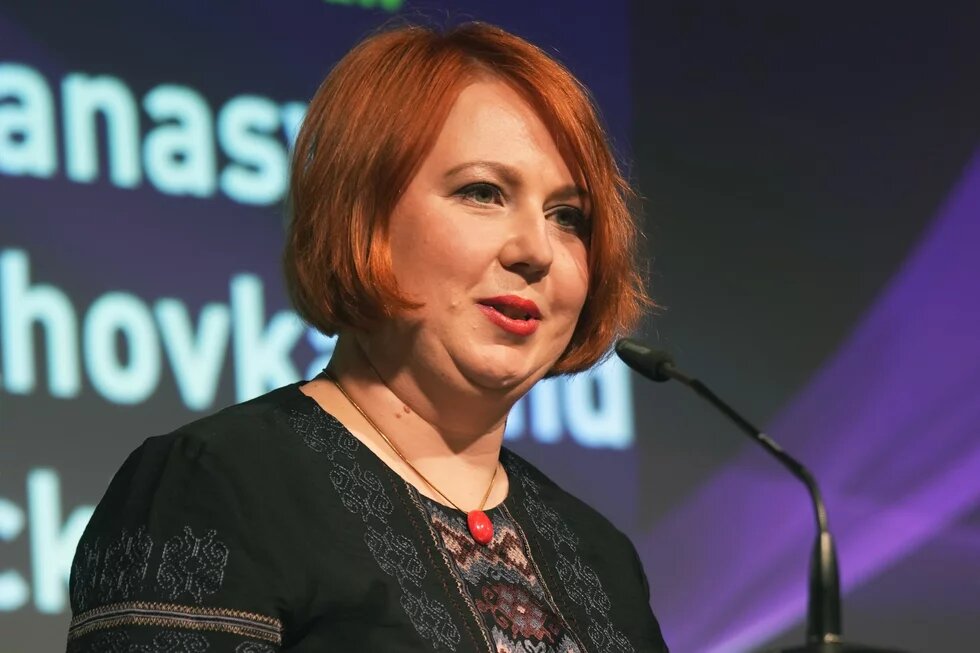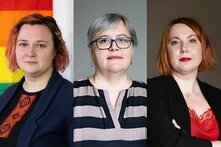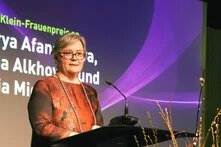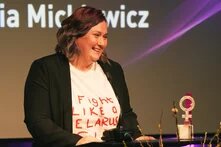For her, the new Belarus began with the Women’s Revolution in 2020, and continues to this very day. Julia Mickiewicz remembers the inspiration that the beautiful and smart women at the rallies have given her, along with the conviction that victory is achievable.

To my dear colleagues and partners; to my friends who I see in this room and who I know are watching this ceremony on YouTube. It is an absolute pleasure, an honour, and indeed a privilege for me to stand here today and to accept the Anne Klein Women’s Award together with two wonderful women, Darya and Irina.
Receiving any award that recognises the successes and fruits of one’s labour is a wonderful thing. But to receive an award for one’s feminist commitment – that is particularly valuable. Unfortunately, not many awards are given to women worldwide. Much of what we do still remains invisible or loses its significance over time.
I want to let you in on a secret: on my desk in my flat is a sign that says “Full-time feminist”; this is a reflection of who I am as a person and everything that I do and believe in. At least in the preceding 25 years. To me, being a feminist means being committed, not indifferent, but empathetic and sensitive. And that’s how it has been for me for as long as I can remember. Even as a child, I had a strong sense of justice; I wanted to help and support those who I believed had suffered injustice, and adults often reprimanded me for taking this stance. I grew up in the Soviet, and later in the post-Soviet era, when the roles of girls and women had been quite narrowly defined. Their rights and opportunities were limited, and the expectations placed on us often did not correspond to our aspirations. And I felt that something was wrong with this picture, but I couldn't put it into words. I didn’t possess the knowledge or experience, and yet I still tried to prevent any type of injustice from occurring and to make an impact in an attempt to prevent this from occurring ever again. And that was the main reason for me getting involved in civic engagement in the early 2000s, and so I began an LGBTQ+ initiative. I later became a journalist, then ran a social democratic youth organisation and, after a while, started an educational project with Swedish partners. In everything I have done and continue to do, feminism and the feminist perspective have always accompanied me as the gateway to my work, my activities and my lifestyle. Today, I hold various positions in different structures and organisations, which gives me public significance as well as status and influence. I try to use this as much as possible as a tool to promote feminist ideas and values.
No democratic politics without the participation and leadership of women
All of this became particularly clear to me and in my life during the protests. For me, the new Belarus began with the Women's Revolution in 2020 and continues to this very day. The memories of the inspiration that the beautiful and smart women gave us during our marches and rallies, and of the conviction that we will soon turn the situation in our favour and absolutely be able to win will remain in my heart forever. And I will continue to hold this view and insist that the Belarusian protest of 2020 (whether consciously or unconsciously) was founded on the feminist principles of inclusion, distributed leadership, horizontality, diversity and caring solidarity. My friend, Olga Shparaga, and I talked about this a lot when we were in prison and held seminars on women's rights for our prison sisters. It was then that I realised that feminist education work never ends and that we must seize every opportunity and every situation to continue pursuing it. I learned so many valuable lessons from the strong-willed and fearless women with whom I was forced to share a very confined space for 15 days. And I am very grateful to them and to everyone I have been fortunate enough to work with in civic engagement in general, and in politics in particular. I know precisely how difficult it is for women there, what additional barriers, obstacles and difficulties they have to overcome, how much sexism, pressure and degradation they are forced to endure. Along with the feeling of loneliness, impostor syndrome and lack of support. Although I am very versed in public speaking, I am still sometimes afraid to express my opinion. However, I know and I believe that without the participation and leadership of women there can be no democratic politics – politics that meet the interests and demands of women themselves and other sensitive groups. And, without them, there cannot be social justice or real gender equality in economic, political and cultural terms either. In difficult moments, I take comfort in our feminist sisterhood and the inspiration of the incredible Belarusian women who are my great loves. They continue their resistance and I never tire of continuing to fight in the same vein, and I will not give up.
Because I have a dream: to live in a Belarus, where the decision-makers have the political will for gender equality, without which an inclusive democracy is impossible. And at least half of them are women. Otherwise it's like a chair with three legs. This not only gives me hope, but is also hope for others – especially for girls like my nieces, Lisa and Masha, ten and six years old, who also live in exile. They belong to the new generation. I learn a lot from them, for example how to stand up for yourself and your boundaries, and I believe that they have a better future ahead of them.
Human rights are our best companions
With anti-gender movements on the rise across Europe and dictators seizing power not only through electoral fraud but also through democratic means, I believe that the world needs feminism as an ideology and a strategy for action more than ever. And the first thing that autocrats do is to start fighting against gender-specific issues: they repeal national equality and inclusion policies or feminist foreign policy, ban abortions or laws prohibiting domestic violence. This is the logic of autocrats, for whom sexism and homophobia are common practice, and feminism is perceived by them as extremism. Our collective solidarity – not only among feminists – must be all the stronger. We must show solidarity in preserving democratic institutions and their humanist foundations, because this is essentially a battle for respect for our human dignity.
I share this award with my beloved FemGroup and my dear colleagues from the ABF organisation, and with all the incarcerated Belarusian female activists who remain in Belarus or live in exile, but who do not give up. Our strength lies in our sisterhood – and this is not just a slogan or fine words. It connects us with each other and with our sisters and female friends in different countries around the world, who continue our feminist struggle 24/7 for a world without violence, discrimination, wars or conflicts. Our voices stand for our choice, and human rights are our best companions.
I dedicate this award to my grandmothers and my mother, as well as to Masha, with whom I was in prison, and to all women who have many talents, wishes and dreams but due to the prejudice and obstacles standing in their way have not had the opportunity to realise them. The indomitable Anne Klein also fought for the rights and opportunities of such women, and her memory is also my inspiration and my inner resource.
Many thanks to the organisers of this award, the jury, the Heinrich Böll Foundation and everyone involved. Today, I am happy. Zhyve Belarus – Long live Belarus!


